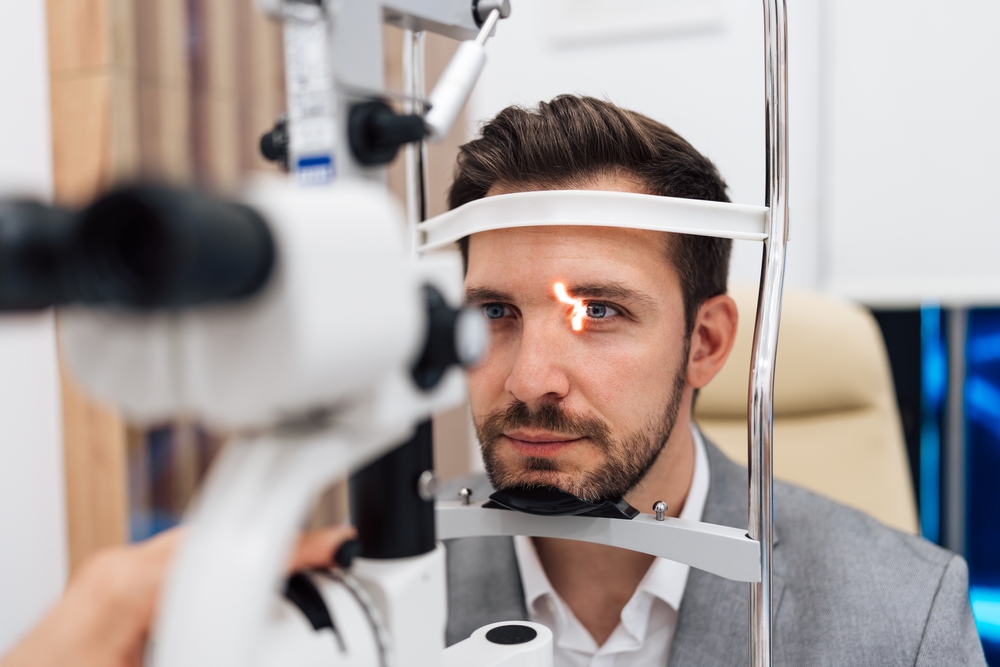
Glaucoma, sometimes called the “silent thief of sight,” is the most common cause of preventable blindness in the world. Luckily, eye doctors can detect glaucoma before it causes vision problems.
Early detection and treatment are key to preventing vision loss. Keep reading to learn more about what causes glaucoma.
What Is Glaucoma?
Glaucoma is an eye condition that damages the optic nerve, which can lead to vision loss and eventually blindness. Specific treatments can slow or stop the progression of glaucoma.
There is no identifiable cause of glaucoma. In many cases, it is associated with excessive pressure inside the eye, but it can also develop in people with normal eye pressure.
Most treatments focus on reducing intraocular pressure to stop glaucoma from progressing.
Anyone can develop glaucoma, though the risk of glaucoma increases with age. People with Black, Asian, or Hispanic heritage may also have a higher risk of developing glaucoma.
Other factors may indicate a higher risk of developing the condition, including:
- Family history of glaucoma
- Certain medical conditions, including diabetes, migraines, high blood pressure, and sickle cell disease
- Thin corneal tissue
- Extreme nearsightedness or farsightedness
- Eye injury or certain types of eye surgery
- Long-term use of corticosteroids, particularly eye drops
The best way to manage glaucoma and prevent progression is to get regular eye exams, which can detect early signs of the eye condition. Early detection allows you to begin treatment and reduce the risk of vision loss.
How Does Glaucoma Affect Vision?
Glaucoma causes gradual damage to the optic nerve, which consists of hundreds of tiny fibers that transmit information between the eye and the brain. When nerve fibers are destroyed, less information can travel from the eyes to the brain.
As more nerve fibers are damaged, you develop blind spots in your field of vision. Peripheral vision is usually affected first.
Without treatment, central vision will also be affected. Eventually, there can be enough damage to the optic nerve to cause blindness.
What Are the Symptoms of Glaucoma?
The most common type of glaucoma is open-angle glaucoma. It often does not cause symptoms in its early stages.
For most people, the first symptom of open-angle glaucoma is loss of peripheral vision. Central vision loss is the main symptom of advanced glaucoma.
There is a less common eye condition called closed-angle glaucoma. It has a sudden onset and is considered a medical emergency.
The symptoms of acute angle-closure glaucoma include:
- Severe headache
- Severe eye pain
- Nausea or vomiting
- Blurred vision
- Halos or colored rings around lights
- Eye redness
If you think you may have acute angle-closure glaucoma, get medical help right away. You need immediate treatment to protect your vision.
Glaucoma Treatment
Because there are no symptoms in the beginning stages, you may not realize that you have glaucoma. Routine eye exams allow your eye doctor at Metro Eye Care to check for early signs of glaucoma so you can begin treatment if necessary.
If detected, there are effective treatments to slow or stop the effects of the eye condition:
- Eye drops to reduce eye pressure
- Oral medications to help reduce fluid production in your eye
- Laser treatments to improve fluid drainage in your eyes
- Surgical procedures to increase drainage in the eyes
Treatment can prevent future vision loss but cannot reverse any vision changes you may already have. You may need to stay on glaucoma treatments for the rest of your life.
Do you have questions about reducing your glaucoma risk? Schedule an appointment at Metro Eye Care in Paramus or Franklin Lakes, NJ, today!
